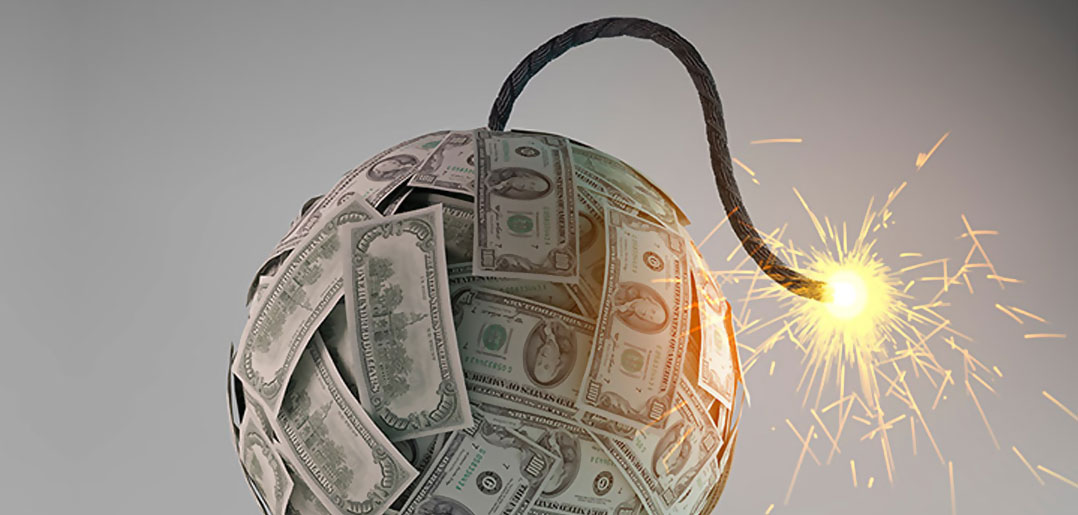
Stephen
Terry, Director

Debt
- A Daily Decision
Commentary
for the March 17, 2018 Sabbath School Lesson
 “The
rich rule over the poor, and the borrower is slave to the lender.” Proverbs
22:7, NIV
“The
rich rule over the poor, and the borrower is slave to the lender.” Proverbs
22:7, NIV
Perhaps one of the greatest challenges facing the
Christian is that of dealing with debt. It seems to permeate all that we do,
both in the secular realm and in the religious. Great corporations are built
using OPM or “Other People’s Money.” When profits do not materialize as
expected, the debt burden becomes too great and the corporation enters
bankruptcy. This is the purpose for forming corporations, to raise funds from
others, spread the risk, and when failure to prosper does happen, only the
funds invested are at risk, as personal finances are distinct and separate from
the corporation.
Magnificent churches are often built the same way.
Members raise what they can locally and then seek outside financing to build
according to their dreams. That financing may come from other denominational
entities along with a favorable interest rate on the funds borrowed. Rather
than scale back plans to what can be paid for without debt or to save for a
debt free church, the members often choose to incur the debt, believing the
funds will be there to service the obligation, either because the church has a
demonstrated history that those funds will be easily repaid or because they
have faith that God will bless them with the funds to fulfil the terms of the
loan. Unfortunately, sometimes major financial contributors can move away, die,
suffer financial reverses, or come into conflict with the denomination to the
extent that they withhold financial support. When this happens, since they
incur no personal liability for doing so, members can walk away rather than continue
to service a debt beyond what the church could reasonably afford without those
major contributors. The debt can be a ticking time bomb that places immense
pressure on the pastoral staff and conference administrators who need to keep
those major contributors happy in order to avoid financial default.
Why do churches take such risks? Perhaps it is because the
members are so used to being awash in debt that they do not see any other way
to proceed. The average American household carries $137,063.00 of debt on an
average household income of $59,039.[i] If one figures a 30% debt
payment load, it would take over seven years to pay off that debt, assuming,
perhaps unrealistically, that 1) no further debt would be accrued in that period,
and 2) the interest rate would be very low. However, automobiles and major
appliances do not last forever. Also homes need more than mortgage payments,
they need maintenance such as painting, roofing, and sundry repairs. If we are
at our maximum debt load, in all likelihood, we may not be able to set aside
funds for those expenses, and we will be tempted to borrow more money to meet
them, creating a perpetual, debt treadmill. We may hope to one day earn more to
somehow “get ahead” of the debt curve, but for many the debt follows them to
the grave, unless they are unable to continue servicing the debt, the debt bomb
explodes, and they end up in bankruptcy court or worse. It is easy to
understand then why finances are often a cause for marriage failure. If one
person is a spender, making impulse buys on credit at high interest rates, and
the other person is a saver trying to avoid debt as much as possible, conflict
can arise. Funds that might have been available for quality of life for the
family have instead gone into the pocket of the lender. That bouquet of
flowers, that dinner and a movie, become hard to obtain except by adding more unsecured
debt. If one person becomes unemployed because
of disability or an economic downturn the marriage can go down in flames with
open warfare over who gets saddled with the debts.
Sadly, the debts of the members can also negatively
affect the church. Otherwise talented individuals may be prevented from being
of service to others because they have already enslaved themselves to the money
lenders. They do not have funds to support evangelism or to care for the needy
in any meaningful way because those funds that might have been available for
service are not even available for their families, let alone the church.
Unfortunately, the problem is so widespread that it may be difficult to run the
church without their participation. But just as unfortunately, if they have not
gotten control of seeing debt as a solution, they will see increased debt as the
solution for the church’s financial issues as well. As the saying goes, if all
you have is a hammer then every problem becomes a nail. If the church is deeply
in debt, and the members are also deeply in debt, the potential for a
catastrophic financial collapse is evident. The grace of God may be the only
thing that has prevented this from happening more often. So is God’s grace tantamount
to granting permission for us to continue following the path of indebtedness because
we believe He will “bail us out?” Wouldn’t that be the same as saying we should
just keep on sinning because after all, grace abounds? We know that the Holy
Spirit will move us toward sanctification and a Christ-like character if we let
Him. His work is not to leave us as we were but to help us grow toward what we
should be. We might therefore safely assume that God’s mercy toward us is not
intended to encourage us to ignore moving toward a proper relationship with
money. So how do we get there?
There are many ways to move toward financial stability. Something that worked
for me was a book given to me by a friend many years ago. “The Richest Man in
Babylon.” By George S. Clason was written for the purpose of demonstrating how
to achieve financial independence in very simple and easily workable terms.
This commentary is unable to reproduce the knowledge of that 144 page book
here, but I have provided a link to the online text.[ii] If you decide to follow
the plan, you may wish to have your own copy for reference and encouragement. It
is available from several sellers on Amazon in both print and Kindle formats. When
I was given a copy of the book, I was at a very low point financially. My wife
had been diagnosed with Multiple Sclerosis, and I had left the pastoral
ministry in the Mid-west to move to a climate where she would not rapidly deteriorate
and die. Unfortunately, because the denomination was self-insured at that time,
we could not find a conference willing to take on the liability of dealing with
a chronic illness, and I found myself unemployed. The university I graduated
from was also far from understanding, threatening devastating legal action if I
could not pay on my student loans. In addition there were some small unsecured
loans outstanding. I also had rent to pay, and several months back rent accumulated.
Things were so desperate that once I found work, I had to bring home toilet
paper from the office to have any at home until the first paycheck arrived. During
all this time, I continued to pay tithe with what little I was able to earn from
the kindness of strangers which allowed me just enough to put gas in the car to
go for job interviews. I was hoping for the outpouring of the blessing that
would be too much to receive as Malachi promised.[iii] That did not happen. Perhaps
I unreasonably looked to the church to somehow provide employment or financial
support. Except for the payment of two months’ back rent at one point by a dear
saint who did so anonymously. Nothing materialized.
Instead, I began to read the book by Clason. Considering
the imagery of Babylon in the books of Daniel and Revelation in the Bible, I
was reticent about some heathen influence that might lead me astray. After all,
the book was not given to me by anyone affiliated with the church. But what I
found was very simple principles of financial management told in the form of
parables that have served me well over the years. Will they miraculously
prevent a person from making bad choices? No. It is only a book that the reader
is free to disregard and do what they wish. Is it an easy path to riches? No.
What it does provide is sound financial principles, and if the reader has the
will to follow them it can lead them to the opportunity to make sensible
choices that will secure their future and that of their family. The value of
the book may be seen in the fact that although I no longer have the same Bible
that I owned back then, almost 40 years later, I still have that worn little
paperback book.
This book has the ability to be of great help to the
Christian, who has chosen to turn from self-destructive habits like alcohol or
drug addiction. There is no advice in the book that can help until those
behaviors have been addressed. For that, Jesus Christ and the renewal that He
brings to a person may be the only answer. But if you have crossed that bridge and
are ready for the book, it is possible to avoid the debt bomb and be as free as
God intended us to be. There is no guarantee you won’t make mistakes through
bad choices, but you will have a path to return to when that happens. I hope if
you follow the advice in that book that you will tell me one day how it worked
out for you.
